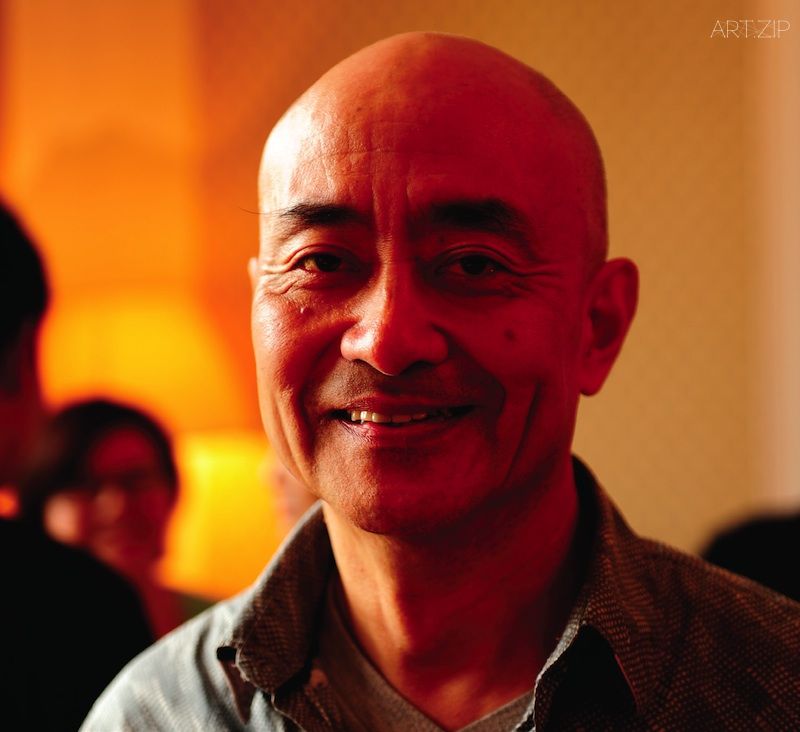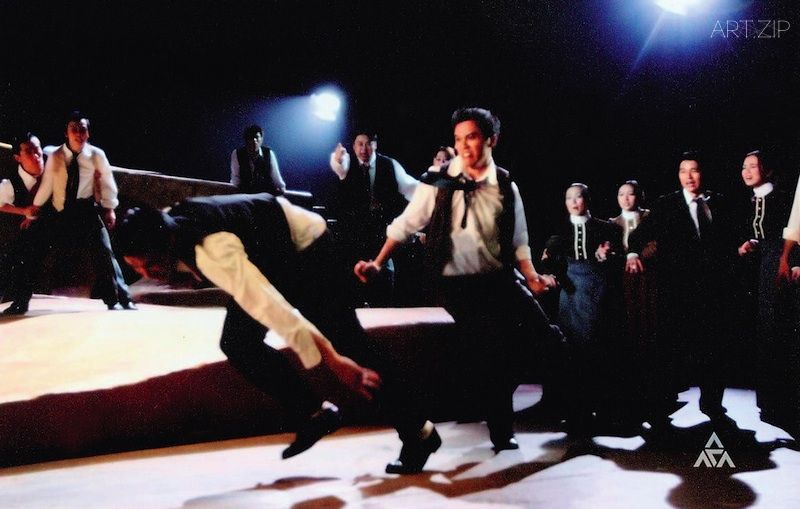
ART.ZiP: As an ethnic Chinese artist, you living abroad all year round, but a lot of your works were created in China (including Hong Kong, Macao and Taiwan), when facing the Chinese audience, how do you understand and solve such a gap?
J:As a matter of fact, there is not and will not be such a gap; because, first of all, I am a Chinese; next, I always keep in mind that I am creating works of art together with my collaborators. I have lived and worked in mainland China, Hong Kong and Taiwan; although the Chinese people in these three places all have Chinese tradition, there are indeed lots of differences between them, even in respect of culture and language, you know, they all speak Chinese, but their wording, topics, meaning and sense of sentences are quite different! Something that the mainland people feel funny may not amuse the Taiwanese in the slightest, and the vivid metaphors used by Hong Kong people may not be followed by other people at all. Therefore, in the creation of a stage play, the audience as the objects must be taken into account, but this is just a problem about adjustment —— I have seen a large number of plays of mainland China, Hong Kong and Taiwan, sitting in the auditorium, I can clearly feel the differences in their habits of seeing a play, I am sensitive to these because I am a Chinese; then, relying on my feelings and according to the creative personalities, tendencies and methods of different performers whom I cooperate with, I carry on my own creation, and thus, there would be no gap between the audience and my creations. And the cooperation is actually a process that I am learning from my collaborators.
ART.ZiP:作為華裔藝術家,您常年生活在國外,但 您 有 不 少 作 品 創 作 於 國 內( 包 括 港 、澳 、臺 ),面 對華人觀眾,您怎樣理解以及如何解決這個gap?
J:其實沒有這個gap,不會有gap,因為首先我 是中國人。再,就是始終記住與合作者共同創作。個人經歷使我在大陸、香港、臺灣都生活和 工作過,這三處的中國人除了都有中華傳統外, 確實存在着很多不同之處,甚至在文化和語言 方面都是如此,要知道講的都是中國話,但用 詞 、話 題 、句 子 的 意 義 、語 感 ,都 很 不 一 樣 的!大 陸人覺得好笑的東西,臺灣人也許根本笑不起 來。香港人的生動比喻,其他人也許完全不懂。 因此在創作舞臺劇時,必須意識到觀眾對象, 但這只是調節的問題——我看大量的大陸、港 臺戲劇,坐在觀眾席裡,很清楚感受到人們的 觀賞習慣的差異,我敏感因為我是中國人,那 麼依據這些感覺,與不同的演出者合作,根據 他們的創作個性、傾向、方法來經營我自己的 創造,就不會和那裡的觀眾產生距離。合作過 程實際上是我在向我合作者”學”的過程。
ART.ZiP: In your theatre creation, what kind of methodology for directing you usually adopt?
J: First, I need to say that I did not receive any professional training and I became a director all on my own, so, it can be said I was groping my way blindly. But even a blind groping still has its reason, that is, I have always been quite interested in some things else in addition to performance, for example, I am also fond of color, light and shadow, music, literature and even architecture, thus, when I am in contact with theatre works, regardless of acting or seeing them, I can not help paying attention to these, which means some though about the framework, understanding and processing of them will come to my mind, this probably is a very hazy ‘director consciousness’? So, when I was still a student in the Acting Department of Theatre Academy, whenever we were rehearsing some clips or small shows, I would often overconfidently propose some views which probably have the nature of ‘director’, or even simply have a hand in it. The occasional success would make me delighted and inspire me with much confidence; thereupon, I did it more and more.
Nevertheless, I still had something for reference, that is, my teachers and directors of troupes, their methods of rehearsing and processing plays certainly influence me a lot. In addition to this, that is my learning of new thought. I studied Stanislavsky’s system in the Theatre Academy and regarded it as a golden rule, although I had some doubts, I dared not to have an objection to it. Later, as a great deal of new thought poured in, I read more and more new works and inspired by many foreign materials (with texts and images). Then, I saw endless possibilities of creation, and thereby could not help devoting myself to the contemporary pluralism that breaks the realism.
So, as far as the methodology for directing is concerned, mine is without a term. But I can roughly express my general principles and ways of directing, that is, what I want is a modern style (and taste) with solid and profound foundation. A modern, unfettered and extremely vivid technique of expression is always what I am fascinated with and striving after; but meanwhile, I will also place emphasis on giving meaning to my techniques. Treating art should be down-to-earth and should not be careless.
ART.ZiP:在戲劇創作中您通常採用怎樣的導演方法論?
J:先說一聲,我當導演不是”科班出身”,是自己 摸索而慢慢做起來的,那麼可以說是瞎摸。但 瞎摸也是有緣由的吧,那就是我歷來對除了表 演之外的其他一些東西也相當有興趣,比如我 對色彩、光和影、音樂、文學、甚至包括建築, 都有一份愛好,這樣我在接觸戲劇作品的時 候,無論是做戲還是看戲,都會不由自主地關注 這些方面,那也就是會產生一些對戲的架構、 把握、處理方面的思考,大概這是一種非常朦 朧的”導演意識”?所以早在戲劇學院表演系學 習的時候,逢到排演片斷或者小節目,我會常常 不自量力地拋出一些大概可稱為是”導演”性質 的意見,或者竟自說自話插手指揮。偶而得手, 欣喜且受鼓舞,於是越做越多。
但我又是有參照的,那就是我的老師們、劇團 的導演們,他們排戲、處理戲的方法無疑給了 我很多影響。然後就是對新思潮的學習。在戲 劇學院我學的是正宗斯坦尼斯拉夫斯基體系 (Stanislavsky System),曾將之當做金科玉律, 雖在有些地方有疑慮,卻斷斷不敢有”反斯”之 舉。後來新思潮大量湧入,新作品也越看越多, 加之外國的資料(文字的和形象的)給予的啟 迪,看到了無窮的創造可能性,便不可控制的投 向打破寫實主義的當代的多元的方向。
因此,要說導演方法論,我是”雜牌”。但我可以 模糊地表述一下我導演時大體的信念和路子, 那就是,我要的是有厚實底蘊的當代風格(和 味道)。現代的、不受拘束的、強烈生動的表現手法是我永遠醉心並努力追求的,唯恐追之不 及,但同時我會注意給予手法以涵義,藝術上 要紮實不馬虎。


